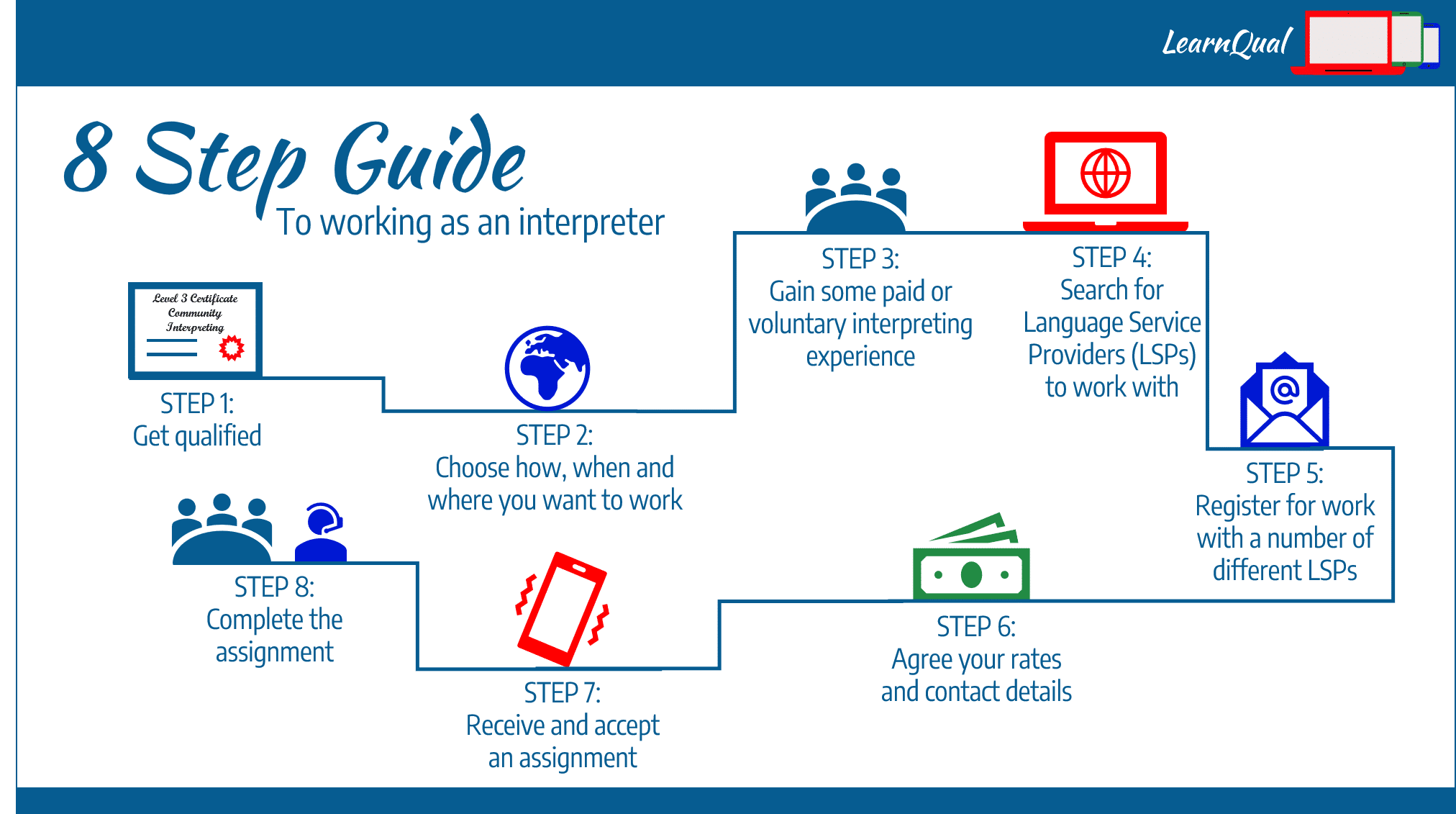
No. Levels 1 and 2 are aimed at voluntary (unpaid) interpreters.
- · Health
· Mental Health
· Job centres / welfare
· Social services
· Housing
· Education
· Immigration
· Local government
The LearnQual Level 3 Certificate in Community Interpreting is an accredited qualification, which means it is UK Government regulated and nationally recognised by interpreting clients and agencies.
This means the qualification can be used to work as a professional interpreter in the UK.
The Level 6 Diploma in Public Service Interpreting (DPSI) is widely regarded as the highest level of interpreting qualification available outside of a university.
The Level 6 DPSI is a very difficult, degree level qualification and is not recommended for anyone other than experienced interpreters who already have a Level 3 Certificate in Community Interpreting due to the high level of knowledge and experience required to pass. Even experienced interpreters and those with legal qualifications regularly fail the Level 6 DPSI.
If you are just starting out in your career, we advise obtaining the Level 3 Certificate in Community Interpreting, then gaining at least 2 years professional interpreting experience before undertaking the Level 6.
LearnQual are based near Leeds, in Yorkshire.
However, the Level 3 Certificate in Community Interpreting is a 100% online course and exam, meaning that there is no need to travel and you can study from your home at a time that is convenient to you.
Levels 1 or 2 are mainly for voluntary work and only includes the
consecutive interpreting skill.
If you have been specifically asked to take a Level 2 by someone
(e.g. a client who wants to offer you paid work) then that is fine but you may
find paid work outside of that client difficult to come by. Level 2 is also
suitable for voluntary work.
Level 3 is best for paid interpreting assignments and will give you
access to a paid interpreting career. It includes both the consecutive
interpreting and sight translation skills. So, if you want to get started on a
paid interpreting career that is the best starting point.
A community interpreter facilitates a conversation between two people who do not speak the same language (e.g. English and Polish) usually in a public service setting such as health, welfare, social services, housing, education, immigration or law.
The speakers take turns to speak with the interpreter interpreting the conversation in between. They also sometimes provide sight translation services where they read out literature in English in the ‘target’ language (e.g. Polish).
As a guide for Level 3 your English should be at level B2 or above:
In everyday speech, this level might be called “confident”, as in “I
am a confident English speaker”. The official level descriptor is “upper
intermediate”. At this level, students can function independently in a variety
of academic and professional environments in English, although with a limited
range of nuance and precision.
For Level 6, your English needs to be at level C1 or above:
In everyday speech, this level might be called “advanced”, and that is the official level descriptor for this level as well, also used by EF SET. At this level, students can function independently and with a great deal of precision on a wide variety of subjects and in almost any setting without any prior preparation.
If you are unsure, you can test your English here for free : https://www.efset.org/quick-check/take-test
Unfortunately, the course isn’t funded at this time, but we do have
easy instalment options to make it more affordable.
Some of our students get funding from the DWP (Job Centre) or ‘back
to work’ charities, so it might be worth speaking with them to see if they can
arrange funding.
- Part 1: consecutive interpreting. You interpret a conversation between a doctor and a patient
- Part 2: Sight translation. You are provided a text in English of around 250 words, you read through it first and then you read it out loud in your other language - like you were reading it for someone who couldn't read the English version.
- That’s it - no questions, no essays, no writing. Just the practical.
The major difference is the way that we deliver the information and or exam only assessment approach.
If you go to the 'About’ page on the website you can find links to the Ofqual site where you can see our qualifications. That means they are genuine, quality products that deliver what they are supposed to.
You can also find our registered company, Learnqual Ltd, on companies house (the government register of registered UK companies).
And see our reviews from students here on Trustpilot.
Although not always a requirement, usually you need a minimum qualifications to become an Interpreter. You would need to hold a minimum of a Level 3 Certificate in Community Interpreting (at least 60 hours of learning, and a recommended minimum of 15 credits). Experience is not always necessary, but also a bonus. Usually, interpreters are aged 18 or above.
Strictly speaking, translators deal with the written word and would normally require a Degree in translation, or a minimum Level 6 or above equivalent (such as a Diploma in Translation (DipTrans)), plus relevant experience.
You can also become a NHS interpreter, providing services in the spoken word and interpreting conversations between doctors and patients. The requirements to become an NHS interpreter are usually a minimum of a Level 3 Certificate in Community Interpreting (at least 60 hours of learning, and a recommended minimum of 15 credits). Experience is not always necessary, but also a bonus.
Interpreter Salary in the UK:
An
interpreter who holds a Level 3 Certificate in Community Interpreting can
expect to make an average of £14.55 per hour (£28,000 per year based on a 37
hour week).
If you
have a Level 6 Diploma in Public Service interpreting (DPSI) you could get
rates of up to £36 per hour or more for some clients, such as legal clients,
but this is not always the case. If, for example, an NHS client is paying £15
per hour the rate will be the same regardless of qualification level. Rates of
pay can also depend on the language combination with 'rare' languages
(languages with a low number of qualified interpreters) commanding higher
rates.
Interpreters convey language
orally, while translators convey language in writing.
Although
language ability is a common skill needed in both roles, the skills needed
for the two roles are often quite different. To be a translator you would need
to be proficient in reading comprehension, transfer and target language
productions skills, along with needing to be able to work efficiently with
Computer Aided Translation (CAT) tools, while interpreters need excellent
listening skills, a high level of spoken ability, clear pronunciation in both
languages, an excellent memory and the ability to think and speak in two
languages at the same time.
You can
read more about interpreting skills in our blog How to Improve Your Consecutive interpreting Skills.
No. While the Diploma in Public Service interpreting (DPSI) will be more than sufficient for you to work with the NHS, most of the
interpreting work available with the NHS can be accessed by interpreters who
hold the Level 3 Certificate in Community Interpreting.
Our qualifications are Nationally accredited and approved by the UK government.
While there isn’t such
a thing as an 'international qualification' usually UK qualifications are
highly respected around the world so it is as close as you can get.
Many people make the mistake of thinking that if they speak two languages, interpreting is easy. That is not the case at all. Interpreting is a demanding job that takes dedication, understanding, skills and knowledge to provide.
To be a high quality interpreter can take years of hard work,
building glossaries, studying language and specialisms and developing
glossaries.
The Level 3 Certificate in Community Interpreting we offer at LearnQual is the ideal entry level qualification for anyone looking to become a paid interpreter (oral translator).
It is suitable for people who are brand new to the profession, and also those who already have some interpreting experience.
The Level 6 Diploma in Public Service Interpreting (DPSI) is the highest level of interpreter qualification, and is suitable for professional interpreters who hold the Level 3 Certificate in Community Interpreting and have at least 2 years of professional interpreting experience.
If you are already working as a professional interpreter and do not need to attend a preparation course, you can take the exam only option of the Level 3 Certificate in Community Interpreting for a reduced price.
How Can I Become a Medical Interpreter?
If you aspire to work as an interpreter in medical settings, you will need several things.
To be a paid interpreter, and to ensure you are delivering a professional, high-quality service the first thing to get is an interpreter qualification, such as the Level 3 Certificate in Community Interpreting (CCI). This qualification is nationally recognised as the entry level standard for paid public service interpreting jobs in not only medical interpreting contexts but also contexts such as job centres...


How Can I Get an Interpreting Job?
If you want to find work as an interpreter, there are 8 main steps that you can follow.
This 8 Step Guide to working as an interpreter is a series of videos that explains how to get qualified, where, when and how you can work, where you might be able to gain some interpreting experience, who provides work, how to register for work, what you need to know about rates of pay, how to receive and accept assignments and how to complete them.
What to Expect from your First Interpreting Assignment?
The day has finally come – you have been studying a language for years, reached a high level of proficiency, completed an interpreting course, acquired your interpreting qualification, found interpreting work with an agency, and finally been given your first interpreting job (assignment).
Now what..?

Complete the form below and one of our team will get back to you. Alternatively, call our helpful and friendly team now on 0333 444 1302.



